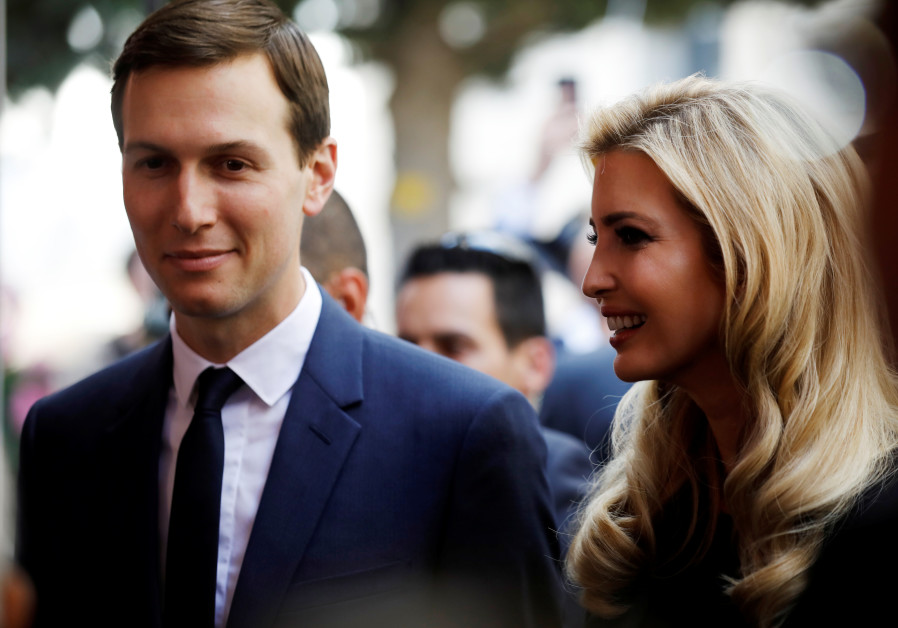Washington once dismissed Kushner – but he keeps racking up victories

Jared Kushner and Ivanka Trump. (photo credit: REUTERS)
WASHINGTON – What business does a fresh-faced real estate heir with no government experience have working in the White House, by the president’s side, on the world’s most intractable problems?
Jared Kushner suffered this criticism throughout his first two years of public service as a senior adviser to his father-in-law, US President Donald Trump. But much has changed in just a few short weeks.
Once mocked for taking portfolios as disparate as criminal justice reform, North American trade negotiations, the opioid crisis and the Middle East peace process, Kushner is beginning to prove his worth. He has racked up major victories that have earned him praise from two of the Trump administration’s fiercest detractors: Mexico City and the Democratic Party. And as he turns his full focus to the Israeli-Palestinian conflict, aides say he does so armed with a string of successes that have bolstered his confidence.
Over the course of the past month, Kushner defied conventional wisdom on two initiatives that count among the legacies achieved so far during the Trump administration: A new trade agreement with Mexico and Canada that replaces NAFTA, and the most sweeping prison reform in decades.
Kushner’s lead role on negotiations that culminated in the US-Mexico-Canada Agreement was hailed by Senate Minority Leader Chuck Schumer, rallied markets, handed Trump a major political victory and earned him the Order of the Aztec Eagle, Mexico’s highest honor for foreigners. And Congress’ overwhelming passage of the First Step Act, a bill that will expand early release and authorize training programs to lower recidivism rates, was widely credited to Kushner as an exceptional act of bipartisan craftsmanship in an era of divisive politics.
Kushner also led campaigns to bring both the World Cup and the Olympics to the US in the coming decade – two additional achievements that the administration argues will lead to jobs, tourism dollars, and opportunities for national unity, showcase and pride.
“Several times on Jared’s projects, he’s been told that it’s over, it’s dead– there’s no way this is possible,” one aide told The Jerusalem Post. “He quietly builds confidence with the people he works with so that they feel comfortable with him – he doesn’t talk to the press about initiatives, and he builds coalitions and results around that trust.”
And yet, if building trust behind closed doors is the key to Kushner’s success, he may be headed for his greatest challenge yet with the Middle East peace plan. Palestinian leaders have dismissed Kushner as a boorish “real estate agent” since December of last year, when the administration recognized Jerusalem as Israel’s capital and relocated the US embassy there.
Communication has broken down between the two parties ever since.
Kushner’s efforts to build a regional coalition around his coming peace plan have faltered, with Republicans and Democrats alike criticizing his relationship with Saudi Arabia’s Crown Prince Mohammed bin Salman – who has been implicated in the brutal murder of journalist Jamal Khashoggi this past October in Turkey – as unethically transactional.
Nevertheless, Kushner’s strategic deliberateness, policy adeptness and willingness to compromise all suggest that his peace plan may surprise those who dismissed his initial appointment, as well as his ability to get stalled peace talks off the ground.
Members of the peace team say that Kushner plans on rolling out the US initiative in the first quarter of 2019.
“All experiences are illuminating, even if they’re not precisely transferable,” the aide continued. “Success is helpful in that it provides you with templates on where to move forward.”
Join Jerusalem Post Premium Plus now for just $5 and upgrade your experience with an ads-free website and exclusive content. Click here>>






Comments are closed.